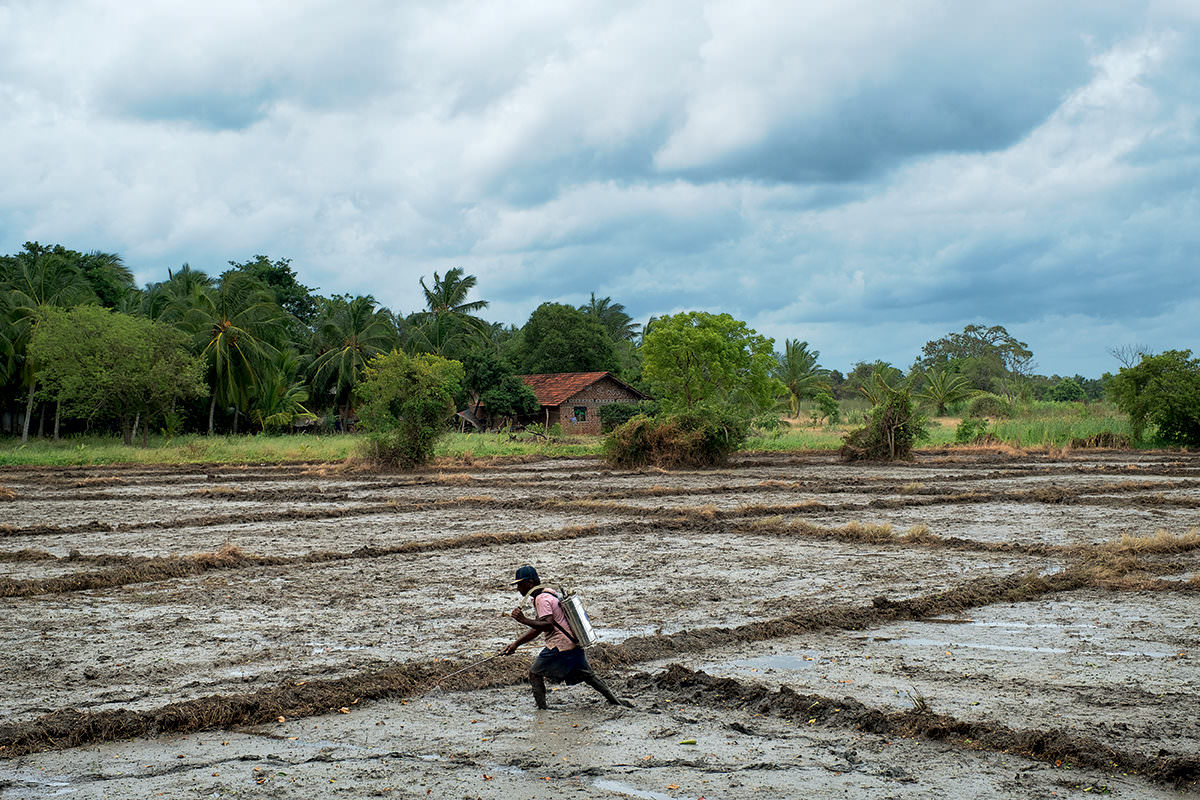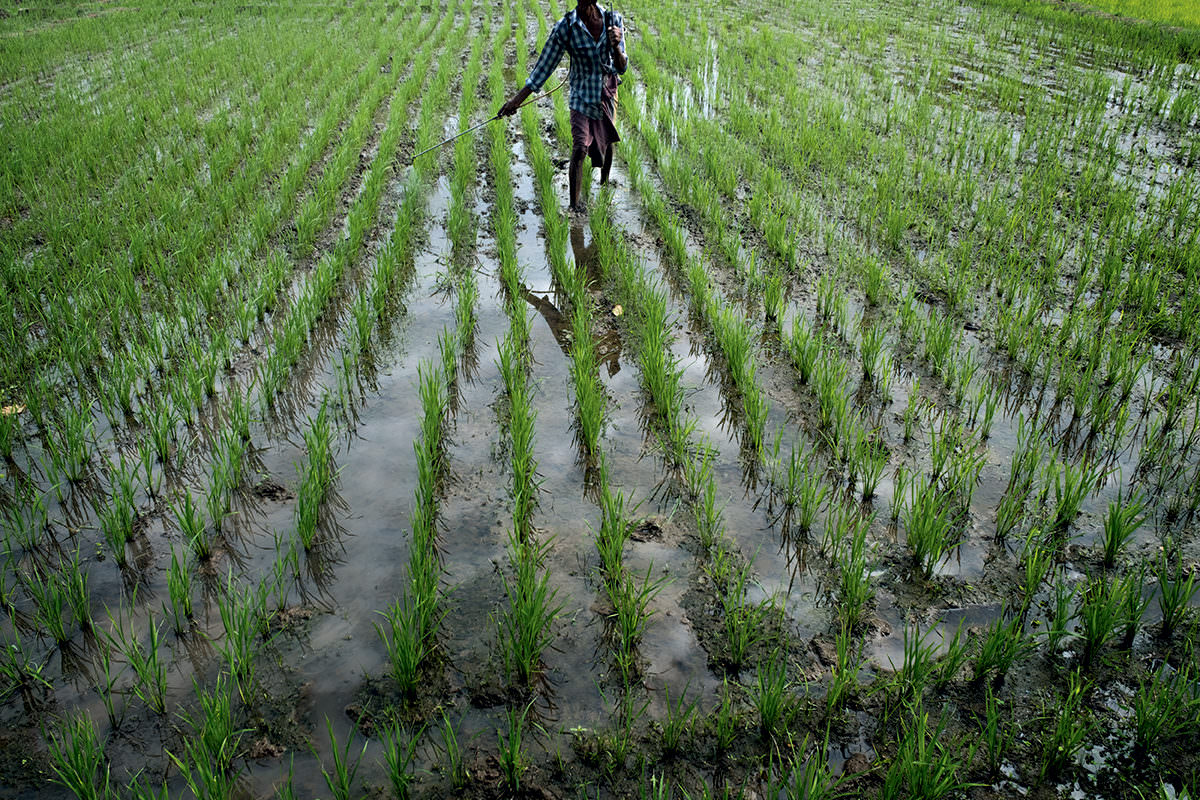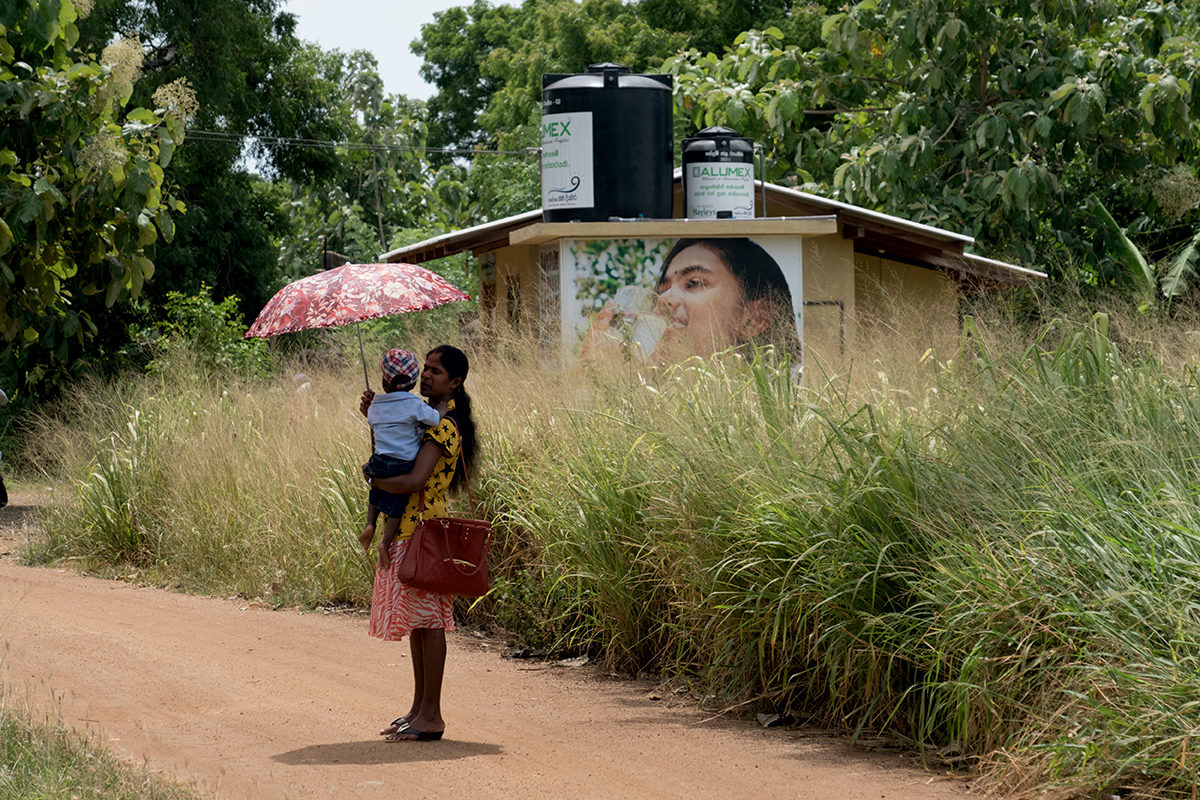The Killing Fields
A deadly kidney disease is ravaging the rice-growing regions of Sri Lanka. Are synthetic fertilizers and pesticides to blame?
The Killing Fields
A deadly kidney disease is ravaging the rice-growing regions of Sri Lanka. Are synthetic fertilizers and pesticides to blame?

As a result, Sri Lankan rice yields have increased by 60 percent since 1979. Unfortunately, a burgeoning public health disaster has arisen alongside this “progress.” Today, a mysterious kidney disease afflicts an estimated 400,000 people in the province, representing about a third of its population.
First-world renal disorders typically accompany obesity, diabetes, or high blood pressure, all rare risk factors in rural Southeast Asia. Baffled epidemiologists refer to the illness ravaging Sri Lanka as “chronic kidney disease of unknown etiology,” or CKDu, which results in a slow, torturous death. Sufferers are unable to pass urine, so their limbs swell with toxic fluid, causing constant pain.
And Sri Lanka is far from the only place affected: CKDu has been identified in the agriculture-dependent tropical areas of at least 10 other countries. New York City photojournalist Ed Kashi, who captured the images on these pages, began chronicling the epidemic four years ago, in Nicaragua and El Salvador, then India, before traveling to Sri Lanka last summer. “I met guys in their twenties who could barely get out of bed for me to take a portrait,” he reports. “There was one Sri Lankan family in which both the father and the son were sick. Neither could work, and the women were forced to abandon their dreams of getting an education in order to become the breadwinners.”
Many of the Sri Lankan farmers Kashi spoke to suspected that the illness stems from contaminated drinking water. Arsenic, cadmium, and other heavy metals found in synthetic fertilizers and pesticides frequently surface in the country’s groundwater. Channa Jayasumana, Ph.D., a medical toxicologist at Sri Lanka’s Rajarata University, believes there’s no single smoking gun, but rather a confluence of factors at play, among them: malnutrition, chronic dehydration, a prevalence of infectious diseases like leptospirosis, and the interaction between groundwater supplies and agricultural chemicals. Specifically, his research focuses on whether those chemicals and heavy metals, along with the water’s naturally occurring calcium and magnesium, are forming new, more acutely toxic compounds. Jayasumana notes that glyphosate, the active ingredient in Monsanto’s Roundup, was originally patented in part as a chelating agent – a substance that readily binds with metals – and may act as a vector, carrying heavy metals to the kidneys.

Though Monsanto vigorously denies Jayasumana’s claims, he counters that the corporation tests its products in temperate Western countries. “Our research shows that pesticides behave differently depending on climate, soil type, and groundwater conditions. It is the duty of Monsanto to show that these chemicals are not toxic in other parts of the world,” says the doctor.
Meanwhile, the Sri Lankan government isn’t taking any chances. President Maithripala Sirisena instituted a national ban on glyphosate upon taking office in 2015. Pesticides containing propanil, carbaryl, chlorpyrifos, or carbofuran had already been outlawed in 2014. Yet farmers continue to purchase the prohibited products at inflated black-market prices.

Companies like Hayleys Agriculture Holdings Ltd. are now funding the installation of reverse-osmosis water filters in the North Central Province’s villages. “The irony,” explains Kashi, “is that this company is a distributor of the pesticides and fertilizers that many Sri Lankans believe caused the epidemic.” Which is why he’ll continue to document the global crisis. “It is unacceptable to me,” the photographer says, “that farmers who produce the rice we consume on a daily basis could be dying on the job.”
Follow us

This work is licensed under a Creative Commons Attribution-NoDerivatives 4.0 International License.
Want to republish a Modern Farmer story?
We are happy for Modern Farmer stories to be shared, and encourage you to republish our articles for your audience. When doing so, we ask that you follow these guidelines:
Please credit us and our writers
For the author byline, please use “Author Name, Modern Farmer.” At the top of our stories, if on the web, please include this text and link: “This story was originally published by Modern Farmer.”
Please make sure to include a link back to either our home page or the article URL.
At the bottom of the story, please include the following text:
“Modern Farmer is a nonprofit initiative dedicated to raising awareness and catalyzing action at the intersection of food, agriculture, and society. Read more at <link>Modern Farmer</link>.”
Use our widget
We’d like to be able to track our stories, so we ask that if you republish our content, you do so using our widget (located on the left hand side of the article). The HTML code has a built-in tracker that tells us the data and domain where the story was published, as well as view counts.
Check the image requirements
It’s your responsibility to confirm you're licensed to republish images in our articles. Some images, such as those from commercial providers, don't allow their images to be republished without permission or payment. Copyright terms are generally listed in the image caption and attribution. You are welcome to omit our images or substitute with your own. Charts and interactive graphics follow the same rules.
Don’t change too much. Or, ask us first.
Articles must be republished in their entirety. It’s okay to change references to time (“today” to “yesterday”) or location (“Iowa City, IA” to “here”). But please keep everything else the same.
If you feel strongly that a more material edit needs to be made, get in touch with us at [email protected]. We’re happy to discuss it with the original author, but we must have prior approval for changes before publication.
Special cases
Extracts. You may run the first few lines or paragraphs of the article and then say: “Read the full article at Modern Farmer” with a link back to the original article.
Quotes. You may quote authors provided you include a link back to the article URL.
Translations. These require writer approval. To inquire about translation of a Modern Farmer article, contact us at [email protected]
Signed consent / copyright release forms. These are not required, provided you are following these guidelines.
Print. Articles can be republished in print under these same rules, with the exception that you do not need to include the links.
Tag us
When sharing the story on social media, please tag us using the following: - Twitter (@ModFarm) - Facebook (@ModernFarmerMedia) - Instagram (@modfarm)
Use our content respectfully
Modern Farmer is a nonprofit and as such we share our content for free and in good faith in order to reach new audiences. Respectfully,
No selling ads against our stories. It’s okay to put our stories on pages with ads.
Don’t republish our material wholesale, or automatically; you need to select stories to be republished individually.
You have no rights to sell, license, syndicate, or otherwise represent yourself as the authorized owner of our material to any third parties. This means that you cannot actively publish or submit our work for syndication to third party platforms or apps like Apple News or Google News. We understand that publishers cannot fully control when certain third parties automatically summarize or crawl content from publishers’ own sites.
Keep in touch
We want to hear from you if you love Modern Farmer content, have a collaboration idea, or anything else to share. As a nonprofit outlet, we work in service of our community and are always open to comments, feedback, and ideas. Contact us at [email protected].by Brian Barth, Modern Farmer
July 31, 2017
Modern Farmer Weekly
Solutions Hub
Innovations, ideas and inspiration. Actionable solutions for a resilient food system.
ExploreExplore other topics
Share With Us
We want to hear from Modern Farmer readers who have thoughtful commentary, actionable solutions, or helpful ideas to share.
SubmitNecessary cookies are absolutely essential for the website to function properly. This category only includes cookies that ensures basic functionalities and security features of the website. These cookies do not store any personal information.
Any cookies that may not be particularly necessary for the website to function and are used specifically to collect user personal data via analytics, ads, other embedded contents are termed as non-necessary cookies.